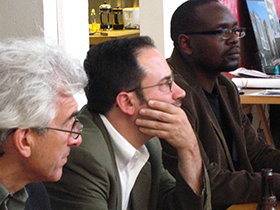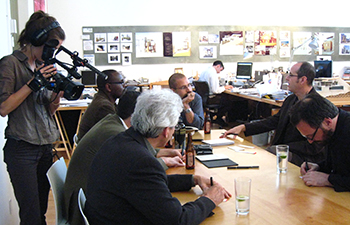In a crisis, governments will often curtail freedom of the press, censoring or shutting broadcasts and newspapers. But blocking websites, slowing the Internet or cutting off SMS messaging can be harder to do. Stopping the flow of information online can be a difficult task, as the Iranian government has learned over the past few weeks, as protesters have posted images to Flickr, video to YouTube, and running commentaries on blogs and Twitter. While the Iranian government would prefer to operate under a cloud, the Interent has proven to be a key distribution medium for spreading news to the rest of the world.
This month’s 5Across video roundtable focused on free speech online in various countries, from Iran to China to Kenya — and even a mention of the U.S. government’s attempts at curtailing speech online over the years. The discussion gave context to Iranian Internet use, its demographics and the way people there get information via satellite TV from Persian-language foreign news sources such as BBC Persian and Voice of America. Plus, we talked about how China uses psychology in making its millions of Internet users believe they are all being monitored.
5Across: Free Speech Online
Guest biographies:
Cyrus Farivar is a freelance technology journalist based in Oakland, Calif. He regularly reports for Public Radio International’s The World, National Public Radio, the Canadian Broadcasting Corporation, The Economist and others. His forthcoming book, “The Internet of Elsewhere,” examines the history and effects of the Internet in four countries around the world, including Iran. It’s due out from Rutgers University Press in 2010.
Danny O’Brien is the International Outreach Coordinator for the Electronic Frontier Foundation. He works to help the EFF, the first digital rights group in the world, collaborate with organizations and individuals fighting for online liberties globally. O’Brien has written columns for the Sunday Times, Irish Times, and also founded the Need to Know email newsletter in the dot-com heyday.

Edwin Okong’o is a Kenyan-born journalist, writer and humorist. He’s an editor at New America Media, an online news service and coalition of ethnic media in the United States. He is also a reporter for PBS Frontline/World. Okong’o received a Masters in Journalism from UC Berkeley.
Scott Rosenberg is the author of the new “Say Everything: How Blogging Began, What It’s Becoming, and Why It Matters,” as well as “Dreaming in Code.” He co-founded Salon.com in 1995 and served as its technology editor and later managing editor for many years. He is also the founder of MediaBugs, a new project funded by the Knight News Challenge.
Kim Spencer, president of Link Media, is an award-winning producer of over 50 documentaries and television specials. A pioneer in using satellite links to foster global dialogue, Kim produced a series of 15 international “spacebridges” including The Moscow Link, a live TV exchange that changed USSR attitudes on nuclear war. Subsequently Kim became coordinating producer of ABC News’ “Prime Time Live.” Spencer is also executive producer of Link TV’s original productions, including “Global Pulse,” “Bridge to Iran” and “Mosaic.”
If you’d prefer to watch sections of the show rather than the entire show, I’ve broken them down by topic below.
Twitter Revolution?
Iran in Context
What Source Do You Trust?
Government Interference
Dangers of Free Speech?
China, Kenya…U.S.?
Credits
Mark Glaser, producer and host
Charlotte Buchen, camera
Julie Caine, audio
Location: Vega Project & Kennerly Architecture office space in San Francisco
Special thanks to: PBS and The Knight Foundation
Music by AJ the DJ
What do you think? How important is the Internet at spreading news when governments curtail freedom of the press? How have you followed the news from Iran? Share your thoughts in the comments below.
Mark Glaser is executive editor of MediaShift and Idea Lab. He also writes the bi-weekly OPA Intelligence Report email newsletter for the Online Publishers Association. He lives in San Francisco with his son Julian. You can follow him on Twitter @mediatwit.


hey give this guy a call for more info about this 610-739-7754
Incredibly on target again. I could watch 5 Across shows all night long. Nice job.
good article
webroyalty